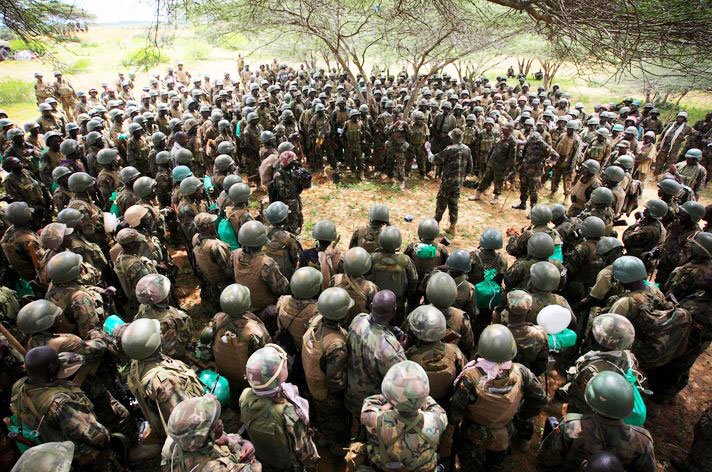By AHMED ARALE
 At the height of the Iraqi war and before the US government sent more troops there, Jack Kelly, a national security writer for thePost-Gazette of Ohio, wrote: “It finally appears that President Bush is ready to light a fire under Premier Nuri al-Maliki of Iraq.”
At the height of the Iraqi war and before the US government sent more troops there, Jack Kelly, a national security writer for thePost-Gazette of Ohio, wrote: “It finally appears that President Bush is ready to light a fire under Premier Nuri al-Maliki of Iraq.”
He argued that if Bush gave al-Maliki veto power over military operations in Iraq, the birth of an Islamic fundamentalist state would be guaranteed.
I do not claim to be an expert on matters relating to national security; however, I wish to point out how the events currently unfolding in Kismayu, the port city in Somalia that was liberated by the Kenya Defence Forces (KDF) in December 2012, might bear some resemblance to how Mr Kelly viewed the events of the Iraq war at the time.
The recent opposition by the Somali Government to partial reimbursement by the UN to Kenya to defray the cost of its warships at the Somali coast was troubling.
What is even more troubling is its recent opposition to KDF and Igad peace efforts in Kismayu. But first, let’s briefly revisit the liberation of Kismayu itself.
The operation was launched in September 2012. Dubbed Operation Sledge Hammer, it was executed with lightning speed and precision.
The battle for Kismayu involved an amphibious landing and simultaneous air, land, and sea bombardments. Al-Shabaab forces in Kismayu quickly collapsed.
Several factors made this success a possibility. First, the KDF facilitated the formation of a temporary administration council for the city, which comprised Somali force commanders and representatives of the liberated population.
Secondly, KDF efforts were supported by the Ras Kamboni Brigade, which fought alongside the KDF.
This force, led by Sheikh Ahmed Madobe, the current head of the temporary administration in Kismayu, consisted of well-disciplined and battle-hardened Somalis, who were waging a guerrilla war against al-Shabaab years before KDF came into the picture.
Far more important was the fact that all of the Somali forces accompanying the KDF, including the Ras Kamboni Brigade, hailed from Kismayu.
But unlike the Iraqi situation, where the US forces were bogged down in street-to-street sectarian fighting, KDF commanders were able to outmanoeuvre the al-Qaeda-affiliated al-Shabaab.
Getting back to my assertion that if Kenya were to yield Kismayu’s security to the government in Mogadishu, it could lose the war, let us examine the position towards Kismayu and KDF adopted by the newly-elected President, Hassan Sheikh Mahmud.
Somalia has not hidden its opposition to KDF presence in southern Somali from the beginning.
What is new are the bold moves it is making to undermine the peace efforts under way in Kismayu, particularly by Igad, to facilitate the establishment of a regional government in the Juba region as permitted by the new Somali Constitution.
To make matters worse, President Mohamud’s protégés in Mogadishu went around painting the KDF as an occupation force.
In a recent communiqué issued by the head of the notorious Hawiye Council in Mogadishu, Jihad was declared on KDF troops.
In the most recent development and the most dangerous, the Somali President dispatched to Kismayu hundreds of well-armed Somali troops led by former warlords Barre Hirale and Col Abbas.
These men are well-known, for they were the leaders of the Juba Valley Alliance, a ruthless militia that terrorised the region for almost a decade.
It is, therefore, puzzling why the President, most of whose country is still in the hands of al-Shabaab, would send his troops to a city already secured by the KDF.
One can only postulate that he is willing to risk the security and stability of Kismayu for the sake of asserting his authority over the city and collecting the revenue generated by its port.
The Somali media that are not aligned with the President’s group are widely reporting that his intention for sending the warlords to Kismayu is to instigate a fight between his militia and the Ras Kamboni Brigade so as to embarrass the KDF forces for failing to keep the peace.
Lastly, Kenya’s soldiers remain in harm’s way because Somalia cannot handle its own security.
Therefore, in the words of Kelly, it is time for Kenya and the rest of Igad countries to light a fire under the Somali leader and not yield the security of Kismayu to him.
Mr Arale is a journalist operating in northern Kenya. (Ahmedarale1970@hotmail.com)
Source: Daily Nation


Leave a Reply